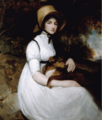Charles Lennox, 3rd Duke of Richmond facts for kids
Quick facts for kids
The Duke of Richmond
|
|
|---|---|
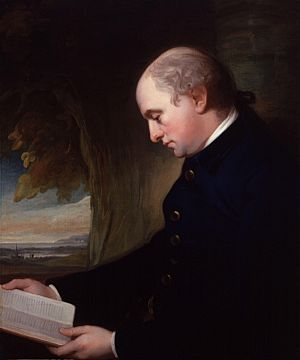
Portrait by George Romney, circa 1777
|
|
| Southern Secretary | |
| In office 23 May 1766 – 29 July 1766 |
|
| Monarch | George III |
| Prime Minister | The Marquess of Rockingham |
| Preceded by | Henry Conway |
| Succeeded by | The Earl of Shelburne |
| Personal details | |
| Born | 22 February 1735 Westminster, London, England |
| Died | 29 December 1806 (aged 71) Goodwood, Sussex, England |
| Resting place | Chichester Cathedral |
| Spouse | Mary Bruce |
| Parents | Charles Lennox, 2nd Duke of Richmond Sarah Cadogan |
| Awards | Knight of the Garter |
| Military service | |
| Allegiance | |
| Branch/service | |
| Years of service | 1752–1806 |
| Rank | Field Marshal |
| Commands | 33rd Regiment of Foot 72nd Regiment of Foot Sussex Militia |
| Battles/wars | Seven Years' War |
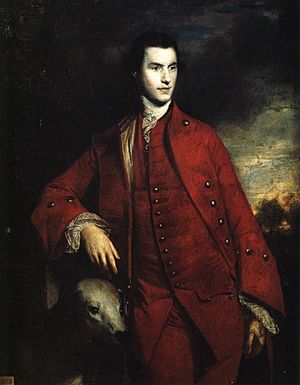
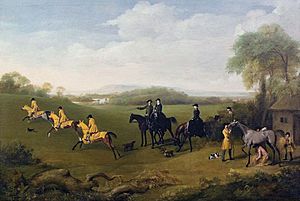
Charles Lennox, 3rd Duke of Richmond (born February 22, 1735 – died December 29, 1806) was an important British Army officer and politician. He was also known as the 3rd Duke of Lennox and 3rd Duke of Aubigny. Until 1750, people called him the Earl of March. He lived at Goodwood House in Sussex and Richmond House in London.
The Duke was a member of the Whig political group. He briefly served as the Southern Secretary, a top government job. He was famous for supporting the American colonists during the American Revolutionary War. He also believed in giving more power to Ireland and wanted to change how Parliament worked. Many people think he was the person who brought a special copy of the US Declaration of Independence to England. This copy is now called the 'Sussex Declaration'. Later, he became the Master-General of the Ordnance, where he made many improvements to the military.
Contents
Who Was Charles Lennox?
His Family Background
Charles Lennox was the son of Charles Lennox, 2nd Duke of Richmond. His mother was Sarah Cadogan. His family lived at Goodwood and Richmond House.
His Life and Career
Early Life and Military Start
Charles Lennox went to Westminster School and Leiden University. When his father passed away in 1750, he became the Duke of Richmond.
He joined the army in 1752 as an ensign in the Coldstream Guards. An ensign is a junior officer rank. He quickly moved up, becoming a captain in 1753. In 1755, he became a member of the Royal Society, a group for important scientists.
Rising Through the Ranks
In 1756, he became a Lieutenant-Colonel in the 33rd Regiment of Foot. He later became a Colonel in the 72nd Regiment in 1758.
He took part in some military actions, like the Raid on Cherbourg in France in 1758. He also served at the Battle of Minden in 1759. He was promoted to Major General in 1761. His regiment was disbanded in 1763 after the Seven Years' War ended.
Political Roles and Reforms
In 1765, the Duke became the British ambassador to Paris. He also joined the Privy Council, a group of advisors to the King. The next year, he briefly served as the Southern Secretary. This was a very important government position. He resigned when Pitt the Elder became Prime Minister.
He was promoted to Lieutenant General in 1770. He was known as "the radical duke" because of his strong views against colonial rule.
Supporting American Colonists
During the debates about the American Revolutionary War, the Duke strongly supported the American colonists. In 1778, he asked for British troops to be removed from America. Even so, he helped raise the Royal Sussex Light Infantry Militia to defend Britain. He commanded this militia until 1804.
He also believed in giving more rights to Ireland. He used the phrase "a union of hearts" to describe what he hoped for between Britain and Ireland. In 1780, he suggested big changes to Parliament. These included allowing all men to vote and having elections every year.
Master-General of the Ordnance
In 1782, he became the Master-General of the Ordnance. This role was in charge of the military's weapons and supplies. He was also made a Knight of the Garter. He became a full General in 1782.
He took on the role of Master-General of the Ordnance again in 1784. He made many improvements to the department. He started a survey of the South Coast, which led to the creation of the Ordnance Survey. This group maps the entire country. He also introduced new artillery, leading to the creation of the Royal Horse Artillery.
Later Life and Retirement
Over time, his political views changed, becoming more conservative. He was dismissed from his government role in 1795. He became a Field Marshal in 1796, the highest rank in the British Army. He also created his own artillery troop, the Duke of Richmond's Light Horse Artillery.
In his retirement, the Duke built the famous racecourse at Goodwood, his family home. He also supported many famous artists, like George Stubbs and Joshua Reynolds.
His Marriage
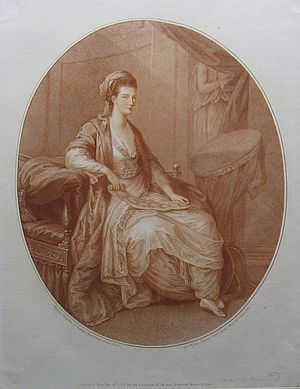
On April 1, 1757, Charles Lennox married Lady Mary Bruce. She was the daughter of Charles Bruce, 3rd Earl of Ailesbury. They did not have any children together.
Death and Succession
Charles Lennox died at Goodwood on December 29, 1806. He was buried in Chichester Cathedral in Sussex. Since he had no legitimate children, his nephew, Charles Lennox, 4th Duke of Richmond, became the next Duke.
The Sussex Declaration
In 2017, a second parchment copy of the US Declaration of Independence was found in England. It was named the "Sussex Declaration." This copy is different because the signatures are not grouped by states. Experts believe it was likely brought to England by Charles Lennox, 3rd Duke of Richmond.
Memorials
Richmond County, Georgia, in the United States, was named after him in 1777.
Images for kids
-
Henrietta Anne le Clerc (1773-1846), 1796 portrait by George Romney; collection of the Duke of Richmond, Goodwood House
 | Sharif Bey |
 | Hale Woodruff |
 | Richmond Barthé |
 | Purvis Young |


